Get free scan and check if your device is infected.
Remove it nowTo use full-featured product, you have to purchase a license for Combo Cleaner. Seven days free trial available. Combo Cleaner is owned and operated by RCS LT, the parent company of PCRisk.com.
What is the fake "BitPay" website?
"Fake BitPay Wallet" refers to a scam that masquerades as the official website of BitPay (bitpay.com) – a cryptocurrency payment service provider. The fake page claims that 1.824 BTC (Bitcoin cryptocurrency) is pending transfer to the user's wallet. The goal is to deceive the victim into paying a bogus commission.
It must be emphasized that the claims made by this scam are false, and it is in no way associated with the actual BitPay or any other existing service providers and entities.
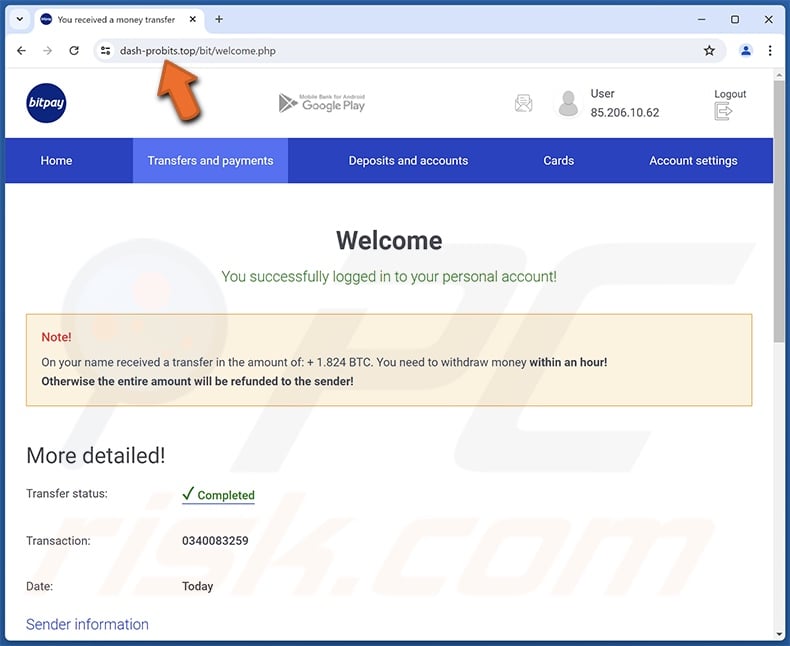
IMPORTANT NOTE: We do not review crypto projects, please do your own research when investing money.
Federal Trade Commission (FTC) states that since the start of 2021, more than 46,000 people have reported losing over $1 billion in crypto to scams – that's about one out of every four dollars reported lost, more than any other payment method.
Fake "BitPay" website overview
This scam is disguised as the BitPay website (bitpay.com) – a cryptocurrency payment service. We discovered this scheme on dash-probits[.]top, but keep in mind that it could also be hosted on other domains. It must be reiterated that the information provided on this site is false, and this scam is in no way associated with the real BitPay.
The deceptive website states that there is a transfer of 1.824 BTC (Bitcoin cryptocurrency) in the user's name. At the time of writing, this amount is worth approximately 160 thousand USD (note that exchange rates fluctuate constantly). Thus, the scam embrangles the victim into disclosing sensitive information and transferring funds to scammers.
Initially, the user is requested to provide their email address for verification purposes. They are informed that they have an hour to proceed with the transfer, although the timer on the page is counting down from 24 hours. The user is asked to sign into their account to proceed with the transfer, and they are provided a temporary password.
Once the code is used in the faked sign-in, the user is informed that there is a 4% transfer fee, listed as 73 USD. The next page requests them to enter their wallet number. Afterward, the site warns that there are wallet limits, and the transfer will be split in two and transferred within ten minutes.
However, billing has requested a commission of 89 USD. Thereby the following page asks the victim to enter their information and provides details on how to pay the supposed fee in Bitcoin cryptocurrency.
Victims of scams like this fake "BitPay" website experience financial loss and potential privacy issues. It must be mentioned that cryptocurrency transactions are practically untraceable – hence, they cannot be reversed. Therefore, victims of these schemes cannot recover their digital assets.
| Name | "BitPay" scam website |
| Threat Type | Phishing, Scam, Social Engineering, Fraud |
| Fake Claim | There is a pending 1.824 BTC incoming transfer. |
| Disguise | BitPay |
| Related Domains | dash-probits[.]top |
| Detection Names | Combo Cleaner (Phishing), Cluster25 (Phishing), ESET (Phishing), Fortinet (Phishing), Kaspersky (Phishing), Full List Of Detections (VirusTotal) |
| Serving IP Address | 193.143.1.195 |
| Distribution methods | Compromised websites, social media spam, rogue online pop-up ads, potentially unwanted applications. |
| Damage | Monetary loss |
| Malware Removal (Windows) |
To eliminate possible malware infections, scan your computer with legitimate antivirus software. Our security researchers recommend using Combo Cleaner. Download Combo CleanerTo use full-featured product, you have to purchase a license for Combo Cleaner. 7 days free trial available. Combo Cleaner is owned and operated by RCS LT, the parent company of PCRisk.com. |
Cryptocurrency-targeting scam examples
We have investigated countless online scams; "$AVAIL Airdrop", "ClaimTokens", "Maestro", "WOOFi Wallet Connection", "Grass Foundation", "Dotmoovs", and "Join MetaMask 3.0" are merely some of our latest articles on ones that target cryptocurrency.
Typically, these schemes operate by tricking users into manually transferring assets to scammer-owned wallets, phishing for wallet log-in credentials, or using draining mechanisms to siphon funds from wallets.
However, the Internet is rife with deceptive and malicious content. While scams are often poorly crafted and full of mistakes, they can be competently made and even convincingly disguised as legitimate sites.
How did I open a scam website?
This fake "BitPay" site has been promoted through spam emails. However, other techniques are not unlikely. Widespread scam endorsement techniques include: various types of spam (e.g., PMs/DMs, social media/ forum posts, browser notifications, SMSes, etc.), websites using rogue advertising networks, intrusive ads (malvertising), mistyped URLs (typosquatting), and adware.
How to avoid visiting scam websites?
Caution is essential to online safety. Always pay attention to URLs and type them carefully. Be wary of websites, ads, and messages making claims that sound too good to be true.
Do not use sites offering pirated content or other questionable services (e.g., Torrenting, illegal streaming/downloading, etc.), as these webpages are typically monetized via rogue advertising networks.
Do not permit suspicious pages to deliver browser notifications; ignore or deny their requests (i.e., click "Block", "Block Notifications", etc.). Approach incoming emails, PMs/DMs, SMSes, and other messages with vigilance; do not open attachments or links found in dubious mail.
Download from official/verified sources and treat installations with care (e.g., study terms and options, use "Custom/Advanced" settings, and opt out of supplementary apps, extensions, etc.) – to prevent bundled/hazardous software from infiltrating the device.
If your computer is already infected, we recommend running a scan with Combo Cleaner Antivirus for Windows to automatically eliminate all threats.
Appearance of the fake "Bitpay" website (GIF):
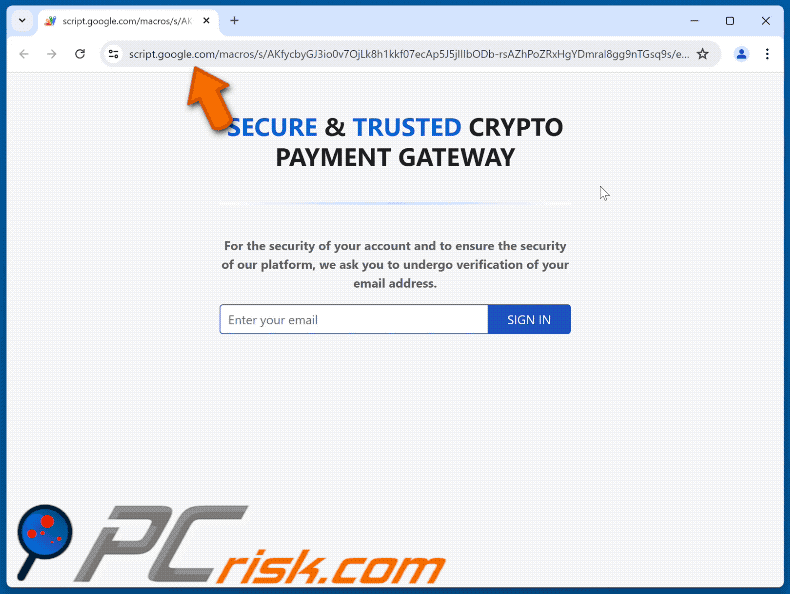
Examples of spam emails promoting this scam:
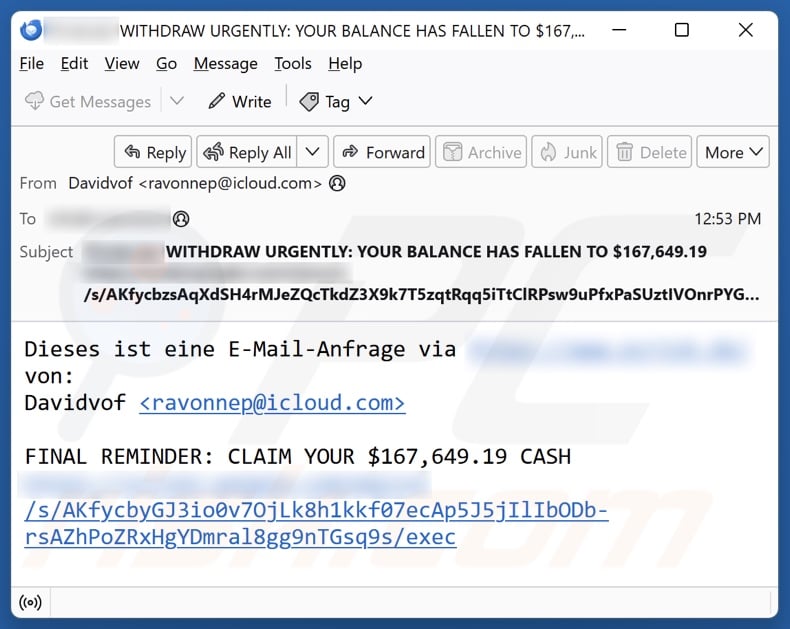
Text presented within:
FINAL REMINDER: CLAIM YOUR $167,649.19 CASH -
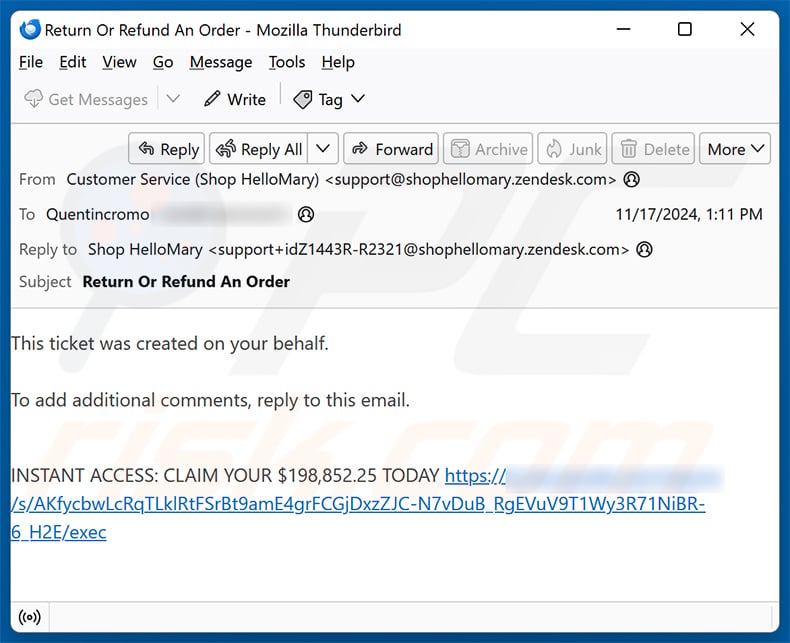
Text presented within:
Subject: Return Or Refund An Order
This ticket was created on your behalf.
To add additional comments, reply to this email.
INSTANT ACCESS: CLAIM YOUR $198,852.25 TODAY -
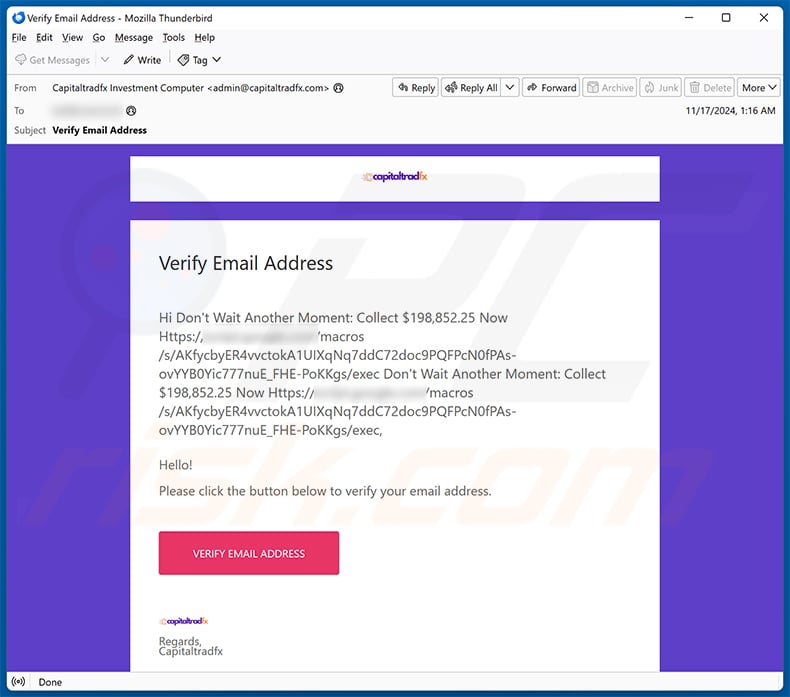
Text presented within:
Subject: Verify Email Address
capitaltradfx
Verify Email Address
Hi Don't Wait Another Moment: Collect $198,852.25 Now - Don't Wait Another Moment: Collect $198,852.25 Now -,Hello!
Please click the button below to verify your email address.
Verify Email Address
CapitaltradfxRegards,
Capitaltradfx
Verify Email Address
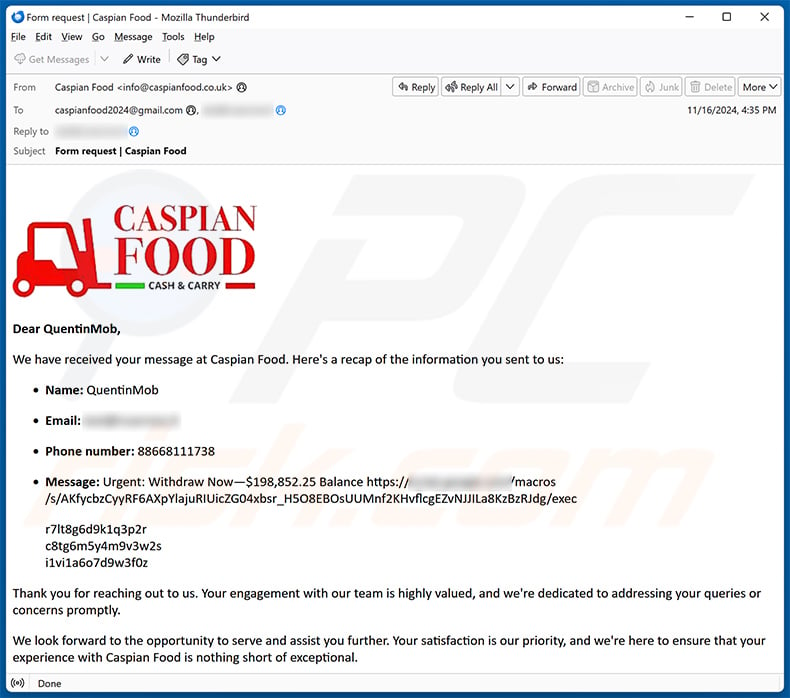
Text presented within:
Subject: Form request | Caspian Food
Caspian Food
Dear QuentinMob,
We have received your message at Caspian Food. Here's a recap of the information you sent to us:
Name: QuentinMob
Email: -
Phone number: 88668111738
Message: Urgent: Withdraw Now—$198,852.25 Balance -
r7lt8g6d9k1q3p2r
c8tg6m5y4m9v3w2s
i1vi1a6o7d9w3f0zThank you for reaching out to us. Your engagement with our team is highly valued, and we're dedicated to addressing your queries or concerns promptly.
We look forward to the opportunity to serve and assist you further. Your satisfaction is our priority, and we're here to ensure that your experience with Caspian Food is nothing short of exceptional.
Warm Regards,
The Caspian Food Team
Caspian Food
Address: 4 Port Hope Rd, Sparkbrook, Birmingham, B11 1JS
Phone: 0121 773 4894
Email: info@caspianfood.co.uk
www.caspianfood.co.uk
Note: This email was sent through a contact form on the Caspian Food website (hxxps://caspianfood.co.uk).
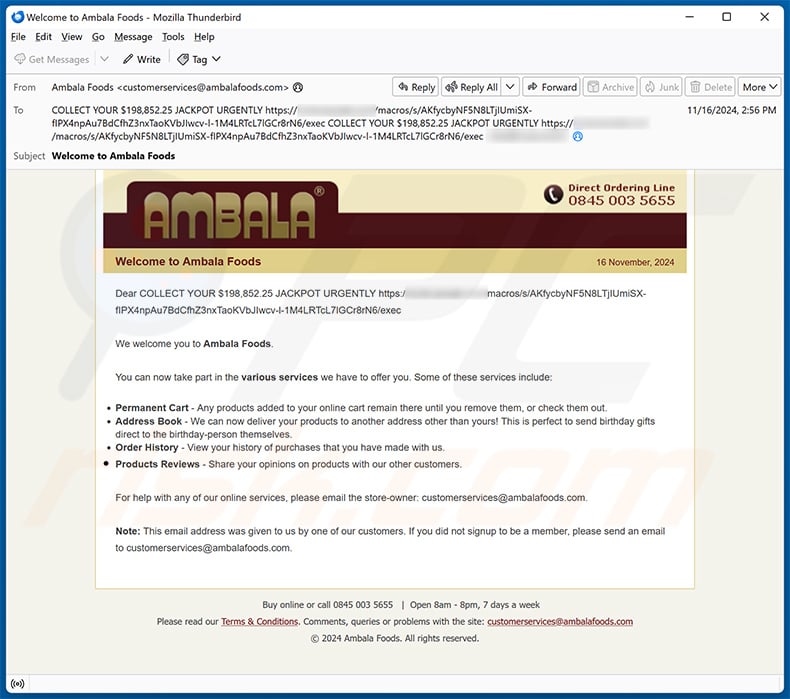
Text presented within:
Subject: Welcome to Ambala Foods
AMBALA
Direct Ordering Line 0845 003 5655
Welcome to Ambala Foods 16 November, 2024
Dear COLLECT YOUR $198,852.25 JACKPOT URGENTLY -We welcome you to Ambala Foods.
You can now take part in the various services we have to offer you. Some of these services include:
Permanent Cart - Any products added to your online cart remain there until you remove them, or check them out.
Address Book - We can now deliver your products to another address other than yours! This is perfect to send birthday gifts direct to the birthday-person themselves.
Order History - View your history of purchases that you have made with us.
Products Reviews - Share your opinions on products with our other customers.For help with any of our online services, please email the store-owner: customerservices@ambalafoods.com.
Note: This email address was given to us by one of our customers. If you did not signup to be a member, please send an email to customerservices@ambalafoods.com.
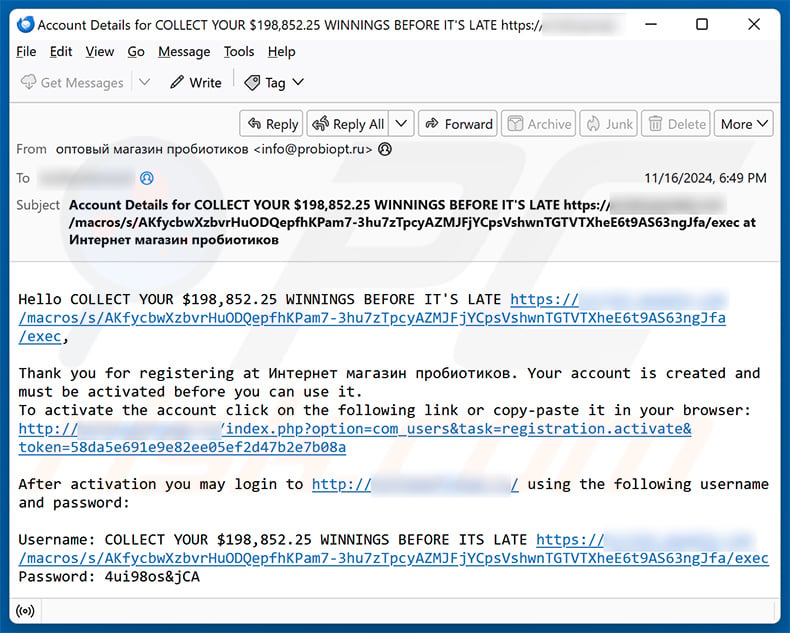
Text presented within:
Subject: Account Details for COLLECT YOUR $198,852.25 WINNINGS BEFORE IT'S LATE - at Интернет магазин пробиотиков
Hello COLLECT YOUR $198,852.25 WINNINGS BEFORE IT'S LATE -,
Thank you for registering at Интернет магазин пробиотиков. Your account is created and must be activated before you can use it.
To activate the account click on the following link or copy-paste it in your browser:
-
After activation you may login to - using the following username and password:Username: COLLECT YOUR $198,852.25 WINNINGS BEFORE ITS LATE -
Password: 4ui98os&jCA
Instant automatic malware removal:
Manual threat removal might be a lengthy and complicated process that requires advanced IT skills. Combo Cleaner is a professional automatic malware removal tool that is recommended to get rid of malware. Download it by clicking the button below:
DOWNLOAD Combo CleanerBy downloading any software listed on this website you agree to our Privacy Policy and Terms of Use. To use full-featured product, you have to purchase a license for Combo Cleaner. 7 days free trial available. Combo Cleaner is owned and operated by RCS LT, the parent company of PCRisk.com.
Quick menu:
- What is "BitPay" scam website?
- How to identify a pop-up scam?
- How do pop-up scams work?
- How to remove fake pop-ups?
- How to prevent fake pop-ups?
- What to do if you fell for a pop-up scam?
How to identify a pop-up scam?
Pop-up windows with various fake messages are a common type of lures cybercriminals use. They collect sensitive personal data, trick Internet users into calling fake tech support numbers, subscribe to useless online services, invest in shady cryptocurrency schemes, etc.
While in the majority of cases these pop-ups don't infect users' devices with malware, they can cause direct monetary loss or could result in identity theft.
Cybercriminals strive to create their rogue pop-up windows to look trustworthy, however, scams typically have the following characteristics:
- Spelling mistakes and non-professional images - Closely inspect the information displayed in a pop-up. Spelling mistakes and unprofessional images could be a sign of a scam.
- Sense of urgency - Countdown timer with a couple of minutes on it, asking you to enter your personal information or subscribe to some online service.
- Statements that you won something - If you haven't participated in a lottery, online competition, etc., and you see a pop-up window stating that you won.
- Computer or mobile device scan - A pop-up window that scans your device and informs of detected issues - is undoubtedly a scam; webpages cannot perform such actions.
- Exclusivity - Pop-up windows stating that only you are given secret access to a financial scheme that can quickly make you rich.
Example of a pop-up scam:

How do pop-up scams work?
Cybercriminals and deceptive marketers usually use various advertising networks, search engine poisoning techniques, and shady websites to generate traffic to their pop-ups. Users land on their online lures after clicking on fake download buttons, using a torrent website, or simply clicking on an Internet search engine result.
Based on users' location and device information, they are presented with a scam pop-up. Lures presented in such pop-ups range from get-rich-quick schemes to fake virus scans.
How to remove fake pop-ups?
In most cases, pop-up scams do not infect users' devices with malware. If you encountered a scam pop-up, simply closing it should be enough. In some cases scam, pop-ups may be hard to close; in such cases - close your Internet browser and restart it.
In extremely rare cases, you might need to reset your Internet browser. For this, use our instructions explaining how to reset Internet browser settings.
How to prevent fake pop-ups?
To prevent seeing pop-up scams, you should visit only reputable websites. Torrent, Crack, free online movie streaming, YouTube video download, and other websites of similar reputation commonly redirect Internet users to pop-up scams.
To minimize the risk of encountering pop-up scams, you should keep your Internet browsers up-to-date and use reputable anti-malware application. For this purpose, we recommend Combo Cleaner Antivirus for Windows.
What to do if you fell for a pop-up scam?
This depends on the type of scam that you fell for. Most commonly, pop-up scams try to trick users into sending money, giving away personal information, or giving access to one's device.
- If you sent money to scammers: You should contact your financial institution and explain that you were scammed. If informed promptly, there's a chance to get your money back.
- If you gave away your personal information: You should change your passwords and enable two-factor authentication in all online services that you use. Visit Federal Trade Commission to report identity theft and get personalized recovery steps.
- If you let scammers connect to your device: You should scan your computer with reputable anti-malware (we recommend Combo Cleaner Antivirus for Windows) - cyber criminals could have planted trojans, keyloggers, and other malware, don't use your computer until removing possible threats.
- Help other Internet users: report Internet scams to Federal Trade Commission.
Frequently Asked Questions (FAQ)
What is an online scam?
Online scams are a type of deceptive content aiming to trick users into performing specific actions. For example, victims can be deceived into transferring funds to scammers, disclosing sensitive information, purchasing products, downloading/installing software, subscribing to services, calling fake helplines, etc.
What is the purpose of online scams?
The goal of online scams is to generate revenue for scammers. Profit can be made by acquiring funds through deception, abusing/selling private data, promoting content, and spreading malware.
I have lost digital assets to the "Fake BitPay Wallet" scam, can I get my money back?
Cryptocurrency transactions cannot be reversed because of their practically untraceable nature. Therefore, victims of scams like this fake "BitPay" website cannot recover their funds.
Why do I encounter online scams?
The most commonly used endorsement techniques include: spam (e.g., emails, DMs/PMs, SMSes, social media posts, browser notifications, etc.), sites employing rogue advertising networks, intrusive advertisements (malvertising), mistyped URLs (typosquatting), and adware.
Will Combo Cleaner protect me from online scams?
Combo Cleaner can scan visited websites for deceptive/malicious content. Therefore, should you happen upon such a page – you will be warned immediately, and further access to it will be restricted.
Share:

Tomas Meskauskas
Expert security researcher, professional malware analyst
I am passionate about computer security and technology. I have an experience of over 10 years working in various companies related to computer technical issue solving and Internet security. I have been working as an author and editor for pcrisk.com since 2010. Follow me on Twitter and LinkedIn to stay informed about the latest online security threats.
PCrisk security portal is brought by a company RCS LT.
Joined forces of security researchers help educate computer users about the latest online security threats. More information about the company RCS LT.
Our malware removal guides are free. However, if you want to support us you can send us a donation.
DonatePCrisk security portal is brought by a company RCS LT.
Joined forces of security researchers help educate computer users about the latest online security threats. More information about the company RCS LT.
Our malware removal guides are free. However, if you want to support us you can send us a donation.
Donate
▼ Show Discussion